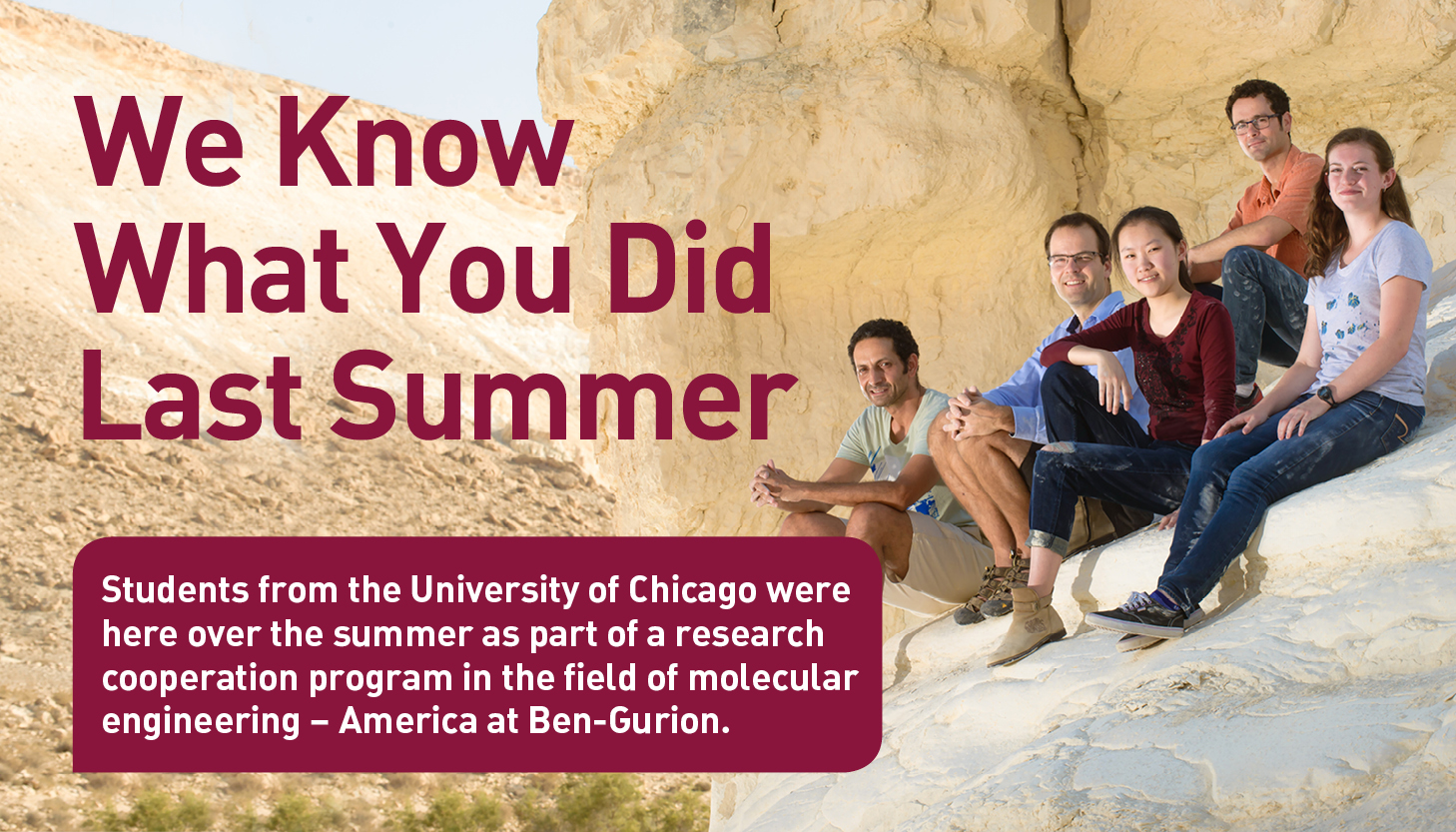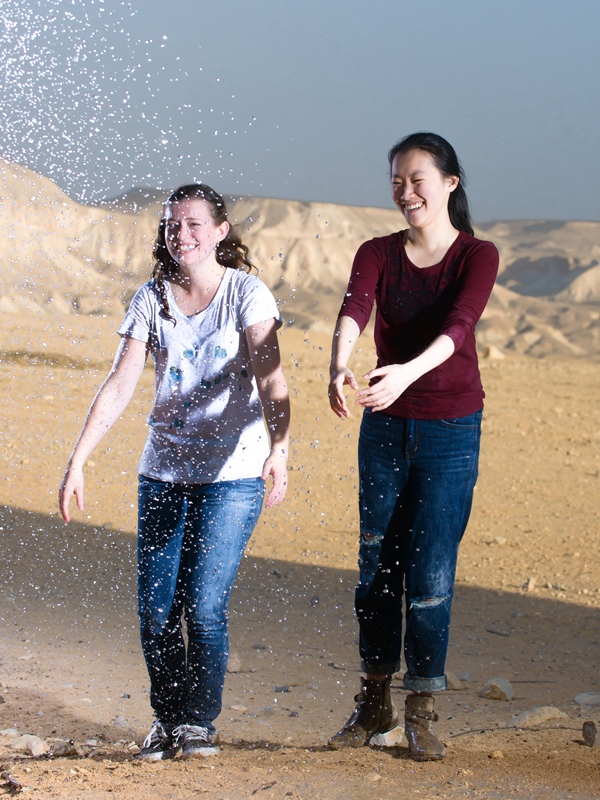Students from the University of Chicago were here over the summer as part of a research cooperation program in the field of molecular engineering – America at Ben-Gurion.

The desert awakens. Clare Singer and Kwan Wong are two students who arrived from the University of Chicago as part of the joint research program in molecular engineering to treat water resources. The program, headed by Prof. Moshe Gottlieb of the Department of Chemical Engineering, is based on research collaboration between the Institute of Molecular Engineering at the University of Chicago and researchers from BGU's Faculty of Engineering, along with members of the Jacob Blaustein Institutes for Desert Research at Sede Boqer.
As part of the program, two to three University of Chicago students apply their scientific and theoretical knowledge to research over a period of ten weeks during the summer months, under the guidance of BGU researchers.
Clare Singer, 21, from Maryland in the US, is studying at the University of Chicago for a double degree in physics and mathematics. She is interested in environmental problems and their technological solutions, but has not had the chance to explore these issues. BGU's program caught her eye because she thought that here she could apply her knowledge of chemistry and physics to solve important global issues, such as the need for clean drinking water.
"I was very happy to come back to Israel. I was here in September last year, as part of the Birthright program. This time I was able to travel all over the country, and of course to meet the wonderful people who live and work in Sede Boqer."
Kwan Wong, also 21, studies chemistry and lives in Chicago. Her parents live in the Guangdong province in China. She first heard about Israel from a professor visiting the Institute of Molecular Engineering at the University of Chicago, who gave a guest lecture on water research and water technology in Israel. "From his lecture, I realized that Israel has significant achievements in water technology, so when I had the chance to come to Israel to the Zuckerberg Institute for Water Research (ZIWR) for two months, I didn't want to miss the opportunity," says Kwan.
The intense heat prevailing in the Negev in the summer worried Clare before her arrival. "I didn't know how people live in the Negev in summer, but it turns out that it is possible. The desert nights are cool, which was a pleasant surprise for me. My morning and evening runs in the desert are a delight I discovered here, and besides, I have excellent air-conditioning in my room."
The hot and dry desert conditions did not deter Kwan. "Why should it?" she asks rhetorically. "I was born and raised in a subtropical city in China, and on summer nights in the Israeli desert there is a cool breeze blowing – a real pleasure!"
Clare's family accepted her decision to fly to Israel. They were not particularly concerned about the security situation, but they missed her, it was difficult for them without her.
Kwan's parents feared for her safety, but when she explained to them exactly where Sede Boqer is situated and that this was a rare opportunity for her that she did not want to give up on, they understood and fully supported it.

How were you received at the Sede Boqer Campus?
Clare: "The researchers, staff and students at Sede Boqer did all they could to help my absorption here. The students in my group were very friendly and even invited me to dinner a few times. I enjoyed studying with them in the summer course in agriculture, which included trips to Arad, the Dead Sea and Jerusalem."
Kwan: "The two months at Sede Boqer were a real experience. I was surprised by the diversity of students – I met students from the United States, China, India and many other countries. The people at Sede Boqer were really friendly and obliging, and there were all kinds of social events organized by the Student Union."
What makes the studies and your research unique?
Clare: "I am part of a project in the laboratories of Prof. Chris Arnusch and Dr. Roy Bernstein (my direct supervisor). We are investigating how to use 3-D printing technologies to improve and streamline the chemical change processes on membrane surfaces designated for the treatment of waste water. Ongoing problems associated with membrane technology include organic fouling, scaling, and biofouling. Improvement and innovation of the membrane materials is an important strategy to manage fouling, and reduce overall water treatment costs. The use of modern printing techniques for the fabrication and modification of polymer membranes in order to improve membrane surface properties and performance is promising, with both economic and environmental advantages."
Kwan: "I am participating in a joint project run by Prof. Moshe Gottlieb and Prof. Moshe Herzberg, in collaboration with Prof. Matt Tirrell of the University of Chicago. The subject of the project is improving the process of water filtration and desalination by using a coating rejecting bacterial growth."
What do you think about the research being carried out at the Zuckerberg Institute for Water Research at Sede Boqer?
Clare: "It's very impressive. The diversity of students studying there and the excellent interdisciplinary research being carried out are of the highest standard. The facilities and equipment are constantly being upgraded, and as such maintain the highest level of technological development in the field. The collaboration between scientists from all disciplines – microbiology, chemistry and engineering, constantly produces new and innovative ideas regarding water treatment."
Kwan: "I was very impressed by the scope of the research carried out there in all areas of water technology. The excellent cooperation between researchers from different disciplines and from different departments and even different campuses creates a great research environment at the Zuckerberg Institute for Water Research."
Clare asked to conclude the joint interview by praising the host country: "My stay here has made me fall in love with the State of Israel. It is a small but multifaceted country. There is diversity in everything: the landscape, the culture, lifestyles. Tel Aviv is very different from Jerusalem, and both are so different from Sede Boqer. I'm enjoying the spaciousness of the Negev and hiking in Nahal Zin. The people in this country are great, warm and welcoming. During our first week here, my friend Kwan and I were walking around the campus and met a professor and his wife who were also walking, and they invited us to dinner!"
This article was first published in the September 2016 edition
of the official Hebrew-language University newsletter Alef, Bet, Gimmel